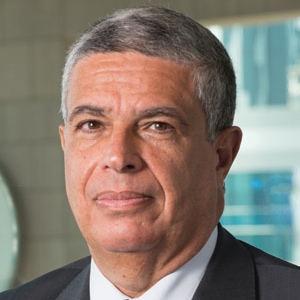Ahli United Bank’s CEO and managing director, Adel El-Labban, talks with Global Finance about operating in high-risk environments and his bank’s pending merger with Kuwait Finance House.

Global Finance: Your merger with Kuwait Finance House is the talk of the town. Why is it happening now?
Adel El-Labban: KFH and AUB have complementary businesses. Following the merger, KFH will become the leading banking institution in both Kuwait and Bahrain, with a combined asset base of $104 billion. In addition to core market leadership in Kuwait and Bahrain, the transaction will create the world’s largest Islamic bank and the sixth-largest bank in the Middle East by total assets, with a diversified footprint across the United Kingdom, Egypt, Iraq, Turkey and Malaysia. The enlarged KFH Group will be well positioned to leverage this international connectivity to the benefit of all domestic clients across the Middle East, as well as institutional and multinational clients abroad.
Cross-border business is a key pillar of AUB’s strategy. This is evident from the fact that, as of fiscal year 2019, around 18% of the loans were generated from cross-border client relationships. The transaction will combine the significant reach of KFH’s client base with AUB’s multigeographical corporate reach.
GF: Could you talk about your operations in high-risk countries, such as Libya and Iraq?
El-Labban: AUB has a [75% shareholding] subsidiary, Commercial Bank of Iraq [CBIQ] in Iraq and a [40% shareholding] associate, United Bank for Commerce & Investment [UBCI] in Libya. Considering the security situation in Iraq and Libya, the business focus of both the entities is on cross-border business on a secured basis and highly selective domestic lending. Both entities undertake a significant funded and unfunded cross-border business with AUB Egypt. It should be noted that CBIQ is one of the top-five performing banks in Iraq in terms of RoAE [return on average equity] and RoAA [return on average assets]. We do not envisage any material change in our business models for CBIQ or UBCI, and we expect that our current conservative approach will help overcome the risks associated with these countries.
GF: When the merger becomes effective, how will it affect Ahli United’s operations?
El-Labban: AUB will continue to operate under the normal course of business and maintain its operations as a wholly owned subsidiary of KFH. No disruption or cessation of any significant line of operations of AUB is expected to occur as a result of the proposed acquisition by KFH, with the bank continuing to provide uninterrupted services to its retail, corporate, private and institutional clients. As KFH is a shariah-compliant institution, AUB’s businesses in Bahrain, Egypt, Iraq and the United Kingdom will be progressively converted to the shariah-compliant banking model, post-acquisition. AUB Kuwait is already a shariah-compliant bank.
Following the proposed acquisition, AUB Kuwait will be converted to a digital bank, which will provide a new and interesting dimension to our product offering and a greater focus to our in-house digital transformation initiatives.
GF: What are the opportunities and challenges in Bahrain today?
El-Labban: Bahrain remains a top destination in the Gulf region for investors, with a rapidly developing fintech base to supplement its well-established services, finance and manufacturing sectors. It is a secure and solid and place to do business due to its transparent and accommodative investment environment.
Foreign investors can enjoy a wide set of benefits for investing in Bahrain, including zero corporate and income tax and free repatriation of capital. Bahrain also allows certain foreign ownership in the financial services sector.
Foreign investors can also benefit from the new rules that allow several new types of financial services licenses to be issued. The Central Bank of Bahrain recently drafted rules with the aim of providing a regulatory framework for the supervision and licensing of cryptocurrency services.
Of course, there are challenges. Low oil prices affect government spending throughout the GCC, which in turn impacts growth and opportunities in financial service sector.
Banks across the region are increasingly challenged to find ways to offset the compounding negative effects of slower credit growth, lower absolute interest rates, pressure on net interest margins and tightening margins from high-quality borrowers, coupled with the increased cost of recurring digital transformation investments.



